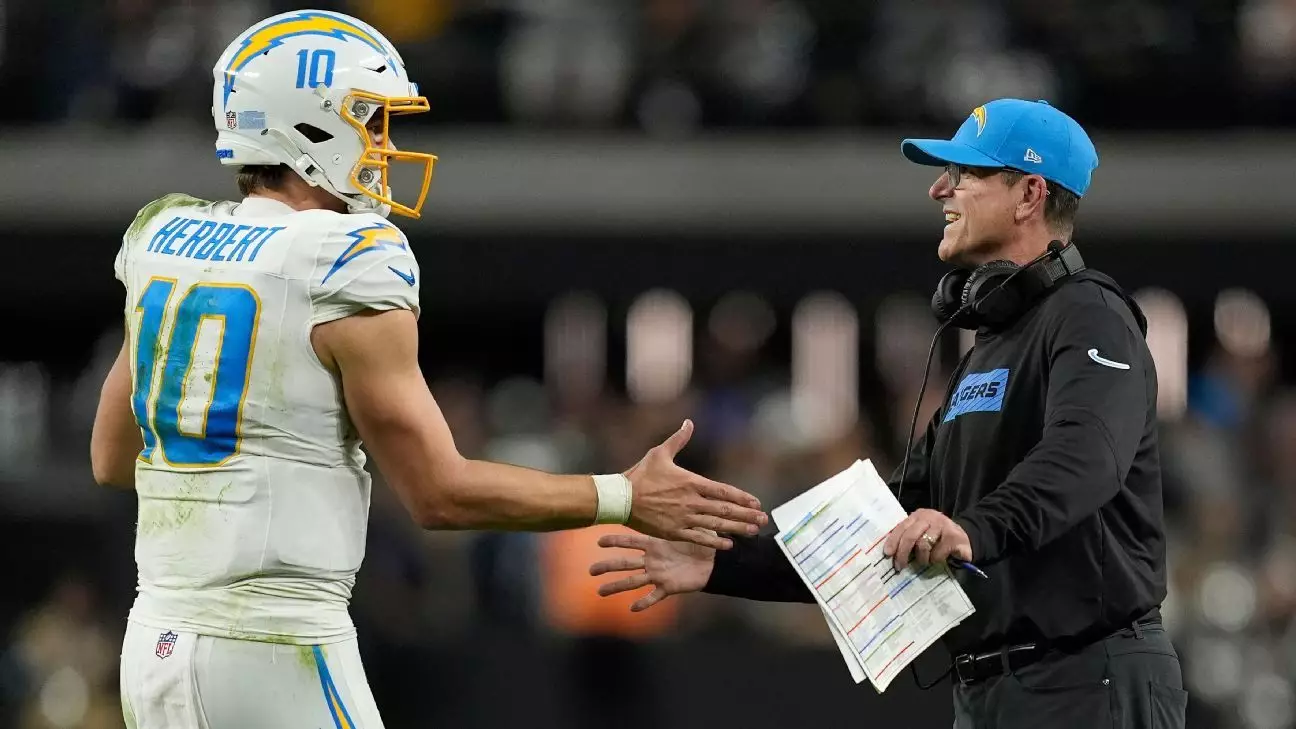The Los Angeles Chargers faced a disappointing conclusion to their season in a wild-card playoff matchup against the Houston Texans, where quarterback Justin Herbert’s uncharacteristic performance drew significant scrutiny. What should have been a promising playoff opportunity turned into an embarrassing 32-12 defeat—highlighted by Herbert’s four interceptions. Such a performance could easily lead to questions about Herbert’s mental fortitude and capability to deliver under pressure. However, the analysis should go beyond the stats and examine the foundational aspects contributing to this dismal outcome.
In the aftermath, Chargers head coach Jim Harbaugh openly reflected on the game with a degree of self-critique that suggests a disconnect between strategy and execution. „We did him a disservice and didn’t put him in the positions to be successful,“ Harbaugh admitted. This public acknowledgment of mismanagement places not just Herbert, but the entire coaching staff, under the microscope. While it’s easy to assign blame to a player after a poor performance, the responsibilities for maximizing player potential lie heavily on the coaches.
The offensive game plan, which appeared to falter dramatically during critical moments, raises red flags about the coaching staff’s preparedness. With Herbert having established himself as one of the league’s most promising quarterbacks during the regular season—boasting the fewest interceptions prior to the playoffs—this underwhelming performance poses questions about whether the coaches adapted adequately to their opponent’s strengths.
Herbert entered the game with a high-performance bar set during the regular season, making the four-interception outing all the more perplexing. His decisions seemed increasingly erratic as the game progressed, starting with an ill-advised cross-body throw that was intercepted during the red zone. This moment exemplifies how pressure can lead to poor judgment, a factor exacerbated by a lack of cohesive support from the team. Furthermore, the critical interception returned for a touchdown is a glaring error that positioned the Chargers at a significant disadvantage.
While standout quarterbacks can rally teams in moments of crisis, Herbert’s play highlighted a lack of composure typically evidenced in less seasoned players. As Herbert grappled with mounting pressure from the Texans’ defense—sustained during 18 of his 36 dropbacks—further questions arose about whether he could effectively adapt and persevere in critical scenarios.
Statistically, Herbert’s lack of success in the playoffs is startling. With a completion rate dipping to 43.8%, he recorded the worst playoff completion percentage since Philip Rivers in 2006. In fact, he made history for all the wrong reasons by throwing more interceptions in this single playoff outing than in the entire regular season. Such statistics make it easy to paint a bleak portrait of his postseason potential, yet there is merit in retaining criticism within context.
General Manager Joe Hortiz attempted to shift the narrative, likening Herbert’s early playoff misfortunes to those of notable quarterbacks such as Peyton Manning and Lamar Jackson, who also battled early setbacks. Hortiz emphasized the importance of patience in development, suggesting that quick assessments based on limited playoff appearances risk overlooking the potential for growth and maturation in a young quarterback’s career.
As the dust settles from this disheartening playoff exit, it is essential for both the Chargers and Herbert to evaluate paths forward. This situation demands a holistic reconsideration of strategic execution alongside player performance. One critical aspect to address is a more fortified line of protection, something that must be prioritized in future seasons.
Meanwhile, Herbert must leverage this experience to cultivate resilience and adaptability, as the weight of playoff performance will follow him unless he can recalibrate expectations moving forward.
The Chargers’ management faces a crucial crossroads: build an effective support system for their star quarterback or risk derailing the promising trajectory of a talented player. Ultimately, Herbert’s future success rests on a collective commitment to learning from past shortcomings, both on the field and in the decision-making offices.


Napsat komentář